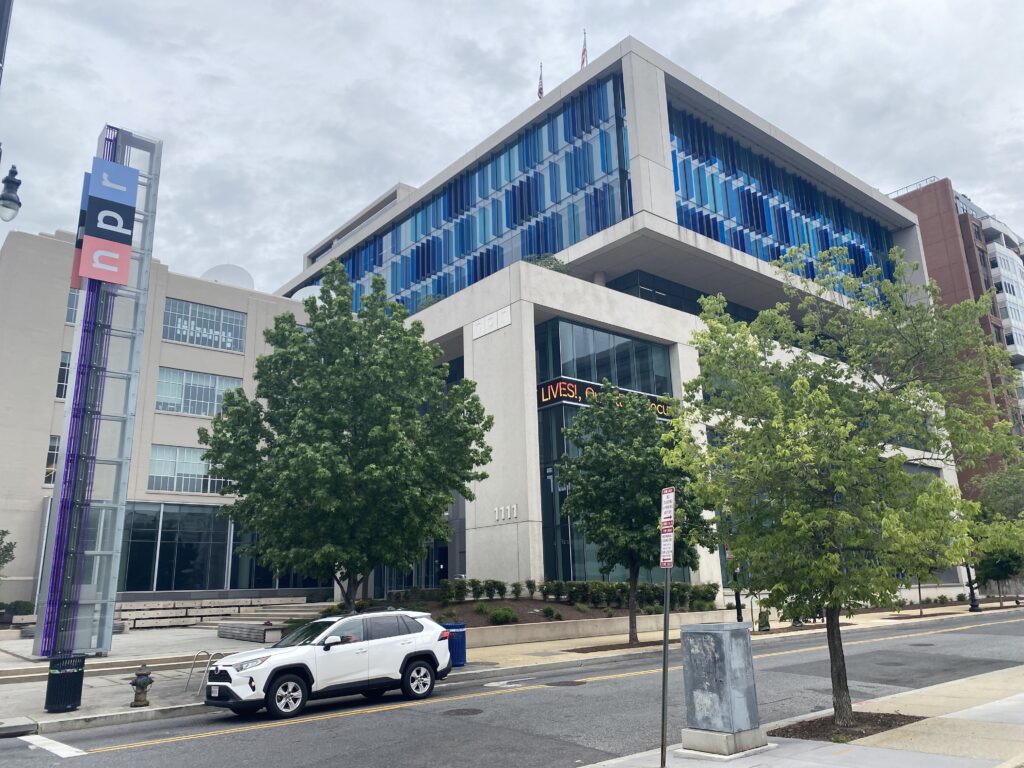
The National Public Radio headquarters in Washington, D.C., on Tuesday, May 27, 2025. (Photo by Jennifer Shutt/States Newsroom)
WASHINGTON — The Trump administration’s request to claw back $9.4 billion in previously approved spending on foreign aid and public media ran into significant opposition Wednesday, potentially dooming its path forward in the Senate.
Numerous GOP lawmakers on the Appropriations Committee, including Chairwoman Susan Collins, expressed concern at how the proposed rescissions would affect American “soft power” as well as local radio and television stations that rely on the Corporation for Public Broadcasting — many in rural America.
Collins, R-Maine, highlighted opposition to cutting already approved funding for CPB, which goes toward National Public Radio, the Public Broadcasting Service and hundreds of local stations outside the nation’s larger metropolitan areas.
“The vast majority of this funding, more than 70%, actually flows to local television and radio stations,” Collins said. “In Maine this funding supports everything from emergency communications in rural areas to coverage of high school basketball championships and a locally produced high school quiz show. Nationally produced television programs such as ‘Antiques Roadshow,’ ‘Daniel Tiger’s Neighborhood,’ are also enjoyed by many throughout our country.”
Collins said she understands objections to the Corporation for Public Broadcasting providing funding to national NPR operations, given what she called its “discernibly partisan bent.”
“There are, however, more targeted approaches to addressing that bias at NPR than rescinding all of the funding for the Corporation for Public Broadcasting,” Collins said.
Effect on Alaska
Alaska Republican Sen. Lisa Murkowski appeared to signal she also opposes cancelling funding that Congress previously approved for public media and told White House budget director Russ Vought that she wanted him to understand the ramifications on her home state.
“I hope you feel the urgency that I’m trying to express on behalf of people in rural Alaska, and I think in many parts of rural America, where this is their lifeline, this is where they get the updates on that landslide, this is where they get the updates on the wildfires that are coming their way,” Murkowski said.
“And so how they will be able to not only get the emergency alerts that they need, but also the weather reporting to make sure that fishermen … can go out safely. So that these communities can be connected when a deadly landslide has come through,” she said.
Rural radio in South Dakota, Nebraska
South Dakota GOP Sen. Mike Rounds pressed Vought to ensure uninterrupted federal funding to local radio stations in rural areas of his home state, even if Congress rescinds the Corporation for Public Broadcasting’s appropriation.
“First of all, we have Native American radio stations in South Dakota. They get their funding through NPR – 90 some percent of what they use. They will not continue to exist if we don’t find a way to take care of their needs,” Rounds said. “It’s not a large amount of money, but would you be willing to work with us to try and find a way for these places where, literally, they’re not political in nature?
“These are the folks that put out the emergency notifications. They talk about community events and so forth. But they’re in very, very rural areas where there simply isn’t an economy to support buying advertising on these stations.”
Vought appeared to agree to work with Rounds, before saying that if Congress approves the rescissions request for the Corporation for Public Broadcasting, the administration wouldn’t pull back funding until the next fiscal year, which starts on Oct. 1.
Vought also pledged to work with Nebraska Republican Sen. Deb Fischer to ensure people in rural areas will have a way to learn about emergency alerts if the rescissions request is approved.
“I am very concerned also about the emergency alerts that come to many places in Nebraska only through that rural radio,” Fischer said. “We’re a state of vastness, very sparsely populated areas that don’t receive cell service in many cases. It’s difficult even with landlines in many areas of my state.”
Reductions to AIDS relief
Chairwoman Collins also said during the nearly three-hour hearing that cutting funding on certain global health programs, including the U.S. President’s Emergency Plan for AIDS Relief, “would be extraordinarily ill-advised and short-sighted.”
“PEPFAR has saved more than 26 million lives and enabled 7.8 million babies to be born HIV-free to mothers living with HIV,” Collins said. “This program remains a bipartisan priority of Congress. After years of commitment and stable investment the finish line is in sight. The United States has the tools to fulfill PEPFAR’s mission and get the job done while transitioning HIV/AIDS treatment and prevention to country ownership by the year 2030.”
Collins argued that the Trump administration is unlikely to spend foreign aid dollars on the same “questionable projects” that were part of the Biden administration.
“Unless the current administration plans to continue these controversial projects that it has identified — which I very much doubt — those projects alone cannot be used to justify the proposed rescissions,” Collins said.
Just before Vought began giving his opening statement to the committee, a group of protesters in the room stood up and began to yell in an attempt to preserve PEPFAR funding. They were escorted out by U.S. Capitol Police.
Kentucky Republican Sen. Mitch McConnell, chairman of the Defense spending subcommittee and former majority leader, appeared to reject some of the proposed foreign aid cuts, arguing they eroded American influence around the world.
“There’s plenty of absolute nonsense masquerading with American aid that shouldn’t receive another bit of taxpayer funding. But the administration’s attempt to root it out has been unnecessarily chaotic,” McConnell said.
“In critical corners of the globe, instead of creating efficiencies, you’ve created vacuums for adversaries like China to fill. Responsible investments in soft power prevent conflict, preserve American influence and save countless lives at the same time. So if we’re concerned about spending, and we should be, it’s important to remember what wars cost.”
South Carolina Republican Sen. Lindsey Graham, however, announced that he will vote for the rescissions package, arguing that some ways the Biden administration spent funds in the PEPFAR account deserved rebuke.
“No more preaching to me. I’m going to vote for this package. And do you know why I’m going to vote for this package? Just as a statement that PEPFAR is important but it’s not beyond scrutiny,” Graham said. “That how you run the government has consequences. Don’t lecture me about being mean or cruel.”
How rescissions work
The Trump administration sent Congress the $9.4 billion rescissions request in early June, allowing the White House budget office to legally freeze funding for the various programs included in the proposal for 45 days while lawmakers decide whether to approve or reject it.
The request called on lawmakers to zero out funding for the Corporation for Public Broadcasting during the next two fiscal years, a total of $1.1 billion in previously approved spending.
It proposed more than $8 billion in cuts to numerous foreign aid accounts run by the U.S. State Department and the U.S. Agency for International Development, including health programs, initiatives that promote democracy, economic development, peacekeeping activities and refugee assistance.
One of the rescissions proposed lawmakers claw back $500 million of the $4 billion that Congress previously approved for “activities related to child and maternal health, HIV/ AIDS, and infectious diseases.
“This proposal would not reduce treatment but would eliminate programs that are antithetical to American interests and worsen the lives of women and children, like ‘family planning’ and ‘reproductive health,’ LGBTQI+ activities, and ‘equity’ programs.”
The House voted mostly along party lines in June to approve the request in full, sending it to the Senate, where it has been on the sidelines for weeks as Republicans instead work toward an agreement on the party’s “big, beautiful bill.”
The rescissions bill isn’t subject to the Senate’s 60-vote legislative filibuster, so it only needs the support of 50 Republicans and Vice President JD Vance’s tie-breaking vote to become law. That, however, must happen before the 45-day clock runs out on July 18.
If Senate leaders do not schedule a floor vote, or that vote does not get the necessary support, the Trump administration would have to spend the funding as previously planned. And the White House budget office would be blocked from sending up a rescissions request for the same accounts for the remainder of President Donald Trump’s time in office.
Senate floor consideration also comes with unlimited amendment debate, giving senators from both parties the chance to call for votes on whether to keep or eliminate each proposed rescission.
Any changes to the bill would require it to go back across the Capitol for a final vote in the House before the deadline.





